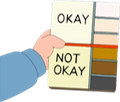Let's bracket the "was the USSR in the right?" question, and let's ask the "how brutal was the Soviet clampdown on these two uprisings?"
1956 Hungary: 2000-3000 killed by the USSR
1968 Prague: 137 killed by the USSR
How does this compare to clampdowns by NATO countries (excluding the US)?
Indonesian National Revolution against the Dutch: 100 000 Indonesians killed by the Dutch
Algerian War of Independence: 250 000 killed by the French (French estimate) - 1.5 Million (Algerian estimate)
French War against Vietnamese Independence: 200 000 dead
Portuguese Colonial Wars: 70,000–110,000 civilians killed by Portugal
Mau Mau Uprising against the UK: "Officially the number of Mau Mau and other rebels killed was 11,000, including 1,090 convicts hanged by the British administration. The Kenya Human Rights Commission has said 90,000 Kenyans were executed, tortured or maimed during the crackdown, and 160,000 were detained in appalling conditions. "
This is a non-exhaustive list with estimates. The actual brutality is not conveyed. The war crimes are often comparable to the Waffen SS.
You get the idea: the colonial powers were incomparably worse.
"Both sides" is when you equivocate two things which are not equal, you're looking for "whataboutism" which is not an actual fallacy, claiming "you're doing whataboutism" was a PR tactic first used by British colonizers when Irish people brought up British violence in response to anti-IRA propaganda.
it get that they're both bad faith ways to shut down discourse and i can see how whataboutism fits; but i was referring to the false equivalency placed between the nato's atrocities and that of the soviet union's in the comment
when it's "both sides" is brought up to shutdown arguments that the democrats have done some of the same things that the republicans did; they're likewise implying that the democrats have fewer of such incidents than the republicans and therefore the argument is invalid.
this was my half snarky way of saying that this comment is a "both sides" example can be applied in the opposite direction where it neuters the effect that "both sides" has with liberals.
I would submit that sometimes "whataboutism" can be related to the issue of topicality in a debate, though. If not addressed properly topicality issues will inevitably derail a discussion as is their nature.
Let's bracket the "was the USSR in the right?" question, and let's ask the "how brutal was the Soviet clampdown on these two uprisings?"
How does this compare to clampdowns by NATO countries (excluding the US)?
This is a non-exhaustive list with estimates. The actual brutality is not conveyed. The war crimes are often comparable to the Waffen SS.
You get the idea: the colonial powers were incomparably worse.
this is the most appropriate "both sides" argument i've ever seen.
"Both sides" is when you equivocate two things which are not equal, you're looking for "whataboutism" which is not an actual fallacy, claiming "you're doing whataboutism" was a PR tactic first used by British colonizers when Irish people brought up British violence in response to anti-IRA propaganda.
it get that they're both bad faith ways to shut down discourse and i can see how whataboutism fits; but i was referring to the false equivalency placed between the nato's atrocities and that of the soviet union's in the comment
when it's "both sides" is brought up to shutdown arguments that the democrats have done some of the same things that the republicans did; they're likewise implying that the democrats have fewer of such incidents than the republicans and therefore the argument is invalid.
this was my half snarky way of saying that this comment is a "both sides" example can be applied in the opposite direction where it neuters the effect that "both sides" has with liberals.
Sorry, I often fail at snark perception
i think it's better that you say something if it's not clear for the people who lurk through all the interactions.
Im not the person who replied to you but I picked up on what you meant
i keep forgetting to use tags.
fwiw, I suspect Hexbear users expect snark more. It's basically the default mode in a bunch of comms.
I would submit that sometimes "whataboutism" can be related to the issue of topicality in a debate, though. If not addressed properly topicality issues will inevitably derail a discussion as is their nature.